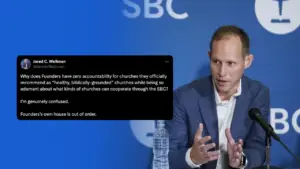If a collective vision can be constructed from the messages at the Baptist Identity Conference, it would include the following ingredients.
1. Being Baptist is much broader than being Southern Baptist
2. Being Baptist is secondary to being Christian
3. Being Baptist means taking church life seriously–inlcuding discipline and a regenerate membership
4. Being Baptist means respecting the autonomy of the local church
5. Being Baptist means not neglecting the interdependence of local churches
6. Being Baptist means holding the authority of God’s Word above tradition, even recent tradition
7. Being Baptist means being confessional
8. Being Baptist means being unafraid to challenge or be challenged from the Word of God
9. Being Baptist means being willing graciously to disagree without dismissing fellow Baptists who stand within our confessional boundaries.
10. Being Baptist means being willing to learn more and apply more of the Word of God
These ideas were addressed both formally and informally during the meetings. Obviously, this list is neither exhaustive nor detailed, but it does capture some of the major concerns that were expressed during the conference. As, I have previously stated, I was very encouraged by the conversation that took place during that meeting.
However, I am not so naive as to think that all of those wonderful ideas will be courageously championed or warmly welcomed by many Southern Baptist leaders and churches in the near future. Anyone who did harbor such idealistic hopes should have been sufficiently disabused of their fantasies by the recent report coming out of the Executive Board’s meeting earlier this week. In many ways, the Southern Baptist Convention reminds me of a ship at sea without a rudder. While we are headed we know not where some are fighting for control of the bridge while many who are on board are wondering whether or not to abandon ship.
If the concerns that were sounded at the Identity Conference can be taken up and sounded throughout the SBC then we will, I believe, have an opportunity to rediscover our rudder and thus our heading as we move further into the 21st century. But, it will not happen without a severed cost and significant change. Let me elaborate my meaning by focusing only on one key issue that was repeatedly raised at the conference–regenerate church membership.
If what those who addressed this issue at Union University last week are correct–and I believe that they are–then the overwhelming majority of our churches are in deep distress spiritually and the source and nature of that distress have nothing to do with being “plateaued” or “declining” in growth or in the numbers of people being baptized (or not being baptized). Rather, if–as Thom Rainer indicated–less than 7 million of our more than 16 million Southern Baptist church members attend even one stated church meeting a week, then the unmistakable conclusion is that something is terribly wrong in our churches. Whatever kind of evangelism we have been practicing is failing miserably in producing disciples, regardless of how many water dunkings it may be producing. Loving church discipline is obviously not being practiced. Where these two realities prevail, Christ is being dishonored by the very people who bear His Name. That, more than budgets, programs or promotions needs to become the priority of our denominational leaders, pastors and churches.
If and when it does, then churches must be led to acknowledge the problem and then understand biblically how to correct it. This will involve deep repentance and significant change in the way most churches “do business.” Imagine what would happen. First Baptist Church of Big City, which has 2700 members, only 1000 of whom attend, will feel compelled from the study of God’s Word to admit and address their unhealthy state. That in and of itself will take great grace and humility, and may well result in a huge upheaval among the members who actually do attend–particularly if Paige Patterson is correct in his assessment that 30-40% of those who show up on a Sunday morning in most of our Southern Baptist churches are unregenerate.
If a typical Southern Baptist church begins to take seriously its call to return to biblical church order, care in accepting members and practicing discipline, there will a huge price to pay. If it is successful, then it will inevitably shrink in terms of its “size” as reported in the Annual Church Profile. It will then be relegated by denominational systems to the category of “declining” and the pastor will soon start receiving from state denominational offices offers to help the church “turn things around.” Some members might become disillusioned by the controversy that could erupt. Other churches in the area may pick up many of the disgruntled former members and spread rumors and half-truths about what is happening. Then, to top it all off, if recent patterns hold true to form, the pastor will probably be branded a “Calvinist” and accused of “ruining a perfectly good church.”
This scenario, or something very like it, has repeated itself over and over in situations where men have moved forward to institute the kind of change necessary to lead a church back to spiritually healthy pastures. Such a journey will not be made without trials and controversies. It need not be destructive (at least, in most cases), but it will not be painless. The end result is worth every drop of sweat and blood and tears that it costs. But the process can be grueling.
That is why my hope is sobered. I want to see more churches make this commitment and beging such a pilgrimmage. But those who lead them need to have their eyes wide open to what is involved in the process. Certainly, the Lord can enable any congregation to be restored to spiritual health. That is what we should hope for. It should be the subject of our prayers. And those of us who are in the trenches, on the front lines of this battle, serving in local churches, should encourage one another to take up this challenge and stay the course.
Where this happens, God is at work. Where God is at work, we have every reason to expect the sufficiency of His grace in Jesus Christ to be made manifest, His glory to be revealed, and His Gospel to go forth in saving power. That is my hope.




















